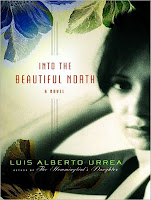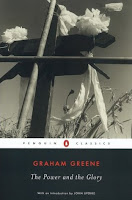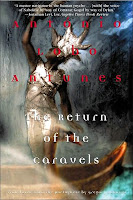 There is a place where time stands still. Raindrops hang motionless in air. Pendulums of clocks float mid-swing. Dogs raise their muzzles in silent howls. Pedestrians are frozen on the dusty streets, their legs cocked as if held by strings. The aromas of dates, mangoes, coriander, cumin are suspended in space.
There is a place where time stands still. Raindrops hang motionless in air. Pendulums of clocks float mid-swing. Dogs raise their muzzles in silent howls. Pedestrians are frozen on the dusty streets, their legs cocked as if held by strings. The aromas of dates, mangoes, coriander, cumin are suspended in space.As a traveler approaches this place from any direction, he moves more and more slowly. His heartbeats grow farther apart, his breathing slackens, his temperature drops, his thoughts diminish, until he reaches dead center and stops. For this is the center of time. From this place, time travels outward in concentric circles - at rest at the center, slowly picking up speed at greater diameters.
Who would make pilgrimage to the center of time? Parents with children, an lovers.
The perfect book for a rainy afternoon. This short book is a wonderful combination of fun and stimulation. Taking Einstein's theory of relativity, specifically his concepts on time, the author imagines dreams that may have run through the great thinker's mind. Each short chapter, typically 3-5 pages, imagines a different world where time is not as we experience it. For example, time may flow backwards, unevenly, slowly, quickly, etcetera.
It wouldn't too difficult to come up with ideas for different structures of time, but what the author has expertly done is to create fun, creative, and intriguing views on how these time concepts may function. The writing is superb, each chapter reading like a prose poem. A beautiful book which well deserved to be the best seller it was.
 Before them, a vast smear of smoke. Not smoke. Birds. Aloft. Suddenly, as one, they turned, vanishing in the air like the louvers of God's own opening window blinds. Appeared. Vanished. Appeared. Swept away to stubbled fields.
Before them, a vast smear of smoke. Not smoke. Birds. Aloft. Suddenly, as one, they turned, vanishing in the air like the louvers of God's own opening window blinds. Appeared. Vanished. Appeared. Swept away to stubbled fields. 

 When they write my obituary. Tomorrow. Or the next day. It will say, LEO GURSKY IS SURVIVED BY AN APARTMENT FULL OF SHIT. I'm surprised I haven't been buried alive. The place isn't big. I have to struggle to keep a path clear between bed and toilet, toilet and kitchen table, kitchen table and front door. If I want to get from the toilet to the front door, impossible, I have to go by way of the kitchen table. I like to imagine the bed as home plate, the toilet as first base, the kitchen table as second, the front door as third: should the doorbell ring while I am lying in bed, I have to round the toilet and the kitchen table in order to arrive at the door. If it happens to be Bruno, I let him in without a word and then jog back to bed, the roar of the invisible crowd ringing in my ears.
When they write my obituary. Tomorrow. Or the next day. It will say, LEO GURSKY IS SURVIVED BY AN APARTMENT FULL OF SHIT. I'm surprised I haven't been buried alive. The place isn't big. I have to struggle to keep a path clear between bed and toilet, toilet and kitchen table, kitchen table and front door. If I want to get from the toilet to the front door, impossible, I have to go by way of the kitchen table. I like to imagine the bed as home plate, the toilet as first base, the kitchen table as second, the front door as third: should the doorbell ring while I am lying in bed, I have to round the toilet and the kitchen table in order to arrive at the door. If it happens to be Bruno, I let him in without a word and then jog back to bed, the roar of the invisible crowd ringing in my ears. 









 It is time that we should know the person about whom we have been talking indiscreetly, if name and surnames could ever add anything useful to the normal identifying features and other statistics, age, height, weight, morphological type, skin tone, colour of eyes, whether the hair is smooth, curly, or wavy, or has simply disappeared, timbre of voice, clear or harsh, weight, characteristic gestures, manner of walking, since experience of human relationships has shown that, once apprised of these details and sometimes many more, not even this information serves any purpose, nor are we capable of imagining what might be missing.
It is time that we should know the person about whom we have been talking indiscreetly, if name and surnames could ever add anything useful to the normal identifying features and other statistics, age, height, weight, morphological type, skin tone, colour of eyes, whether the hair is smooth, curly, or wavy, or has simply disappeared, timbre of voice, clear or harsh, weight, characteristic gestures, manner of walking, since experience of human relationships has shown that, once apprised of these details and sometimes many more, not even this information serves any purpose, nor are we capable of imagining what might be missing.








 So this is a history book about the Enlightenment and the American Revolution that travels from the carbon cycle of the planet itself, to the chemistry of gunpowder, to the emergence of the coffeehouse in European culture, to the emotional dynamics of two friends compelled by history to betray each other.
So this is a history book about the Enlightenment and the American Revolution that travels from the carbon cycle of the planet itself, to the chemistry of gunpowder, to the emergence of the coffeehouse in European culture, to the emotional dynamics of two friends compelled by history to betray each other.



